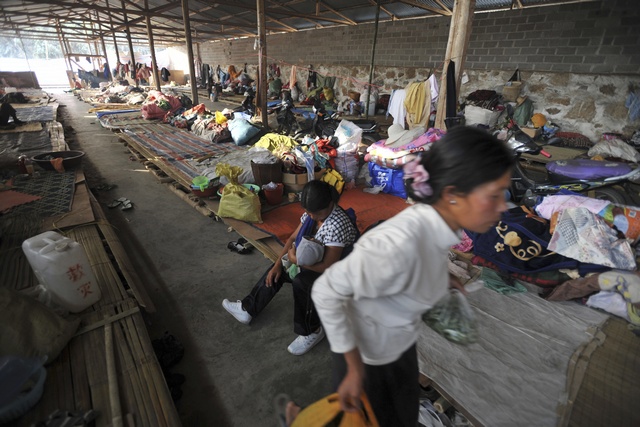A UN body tasked with pushing for workers’ rights and an end to forced labour in Burma has been granted access to conflict zones in the country’s border regions that for years have been largely off-limits to international monitoring groups.
The agreement means the International Labour Organization (ILO) becomes one of the first overseas bodies to begin sustained operations in the volatile areas where Burma’s government has been battling ethnic armies.
To the surprise of many observers, the defence ministry, widely depicted as hostile to the nascent reform programme in Burma, has also endorsed the move, which comes amid a push by Naypyidaw to persuade rebels groups to sign ceasefires.
Steve Marshall, head of the ILO office in Rangoon, says the ministry’s signature on the Memorandum of Understanding (MoU) agreed in March is “very positive and very telling”, particularly given that the ILO will be directly addressing abuses carried out by the army.
He adds that not only will the defence ministry give the green light for the ILO’s work in conflict zones, but that it “has agreed to be an active partner” in the application of plans laid down by the group.
A copy of the MoU seen by DVB details the tasks that lie ahead for the ILO, which has been working under a limited mandate in Burma for 10 years. It includes a raft of action plans for the conflict zones, ranging from ending forced labour associated with energy projects, to stopping the recruitment of civilians and prisoners to act as army porters.
Human Rights Watch (HRW) last year released a damming report in which it said the army’s practice of taking convicts from their cells and transporting them hundreds of miles to the frontline, where they are often forced to walk in front of troops to act as human minesweepers, amounts to war crimes.
That practice has been well documented by rights groups, but largely denied by the government. Its inclusion in the MoU becomes one of the first acknowledgments, albeit tacit, by the administration of President Thein Sein of the abuses carried out by its military.
David Mathieson, Burma researcher at HRW, said however that while the MoU was a step in the right direction, “there should be no illusions that ending a decades-long reliance on forced labour by the Burma army is going to end any time soon”.
Burmese troops, he says, “see the local population as a resource, because they have institutional distain for ordinary people and because their vaunted army can’t logistically sustain them”.
Under Thein Sein, attempts to broker peace with ethnic armies have met with varying levels of success. Although a number of tentative truces have been signed, sporadic fighting continues in Shan state and Karen state. Both sides to the conflicts have however continued with negotiations.
Marshall says he and colleagues will be able to support the post-ceasefire process, which includes social and economic development, as well as reintegrating the hundreds of thousands of civilians displaced by decades of fighting.
“There will of course be sensitivities in what will likely be a fragile situation,” he says. “However with appropriate continuing communication and consultation at each step and with all stakeholders buying in to the objectives, these should be able to be overcome.”
Burma’s government has committed itself to eliminating forced labour and conscription by 2015. Part of this is an agreement with the ILO to implement training programmes targeting, amongst others, the police and judiciary, in a bid to weed out the practice from state bodies.
But not all are confident that the three-year timeframe is realistically achievable. Forced labour stems from a “culture of superiority”, Mathieson says, and changing this “will take more than an agreement”.
“It requires a complete overhaul of the nature of the military and how it views the civilian population. It will also require constitutional reforms, to remove the immunity from civilian prosecution that the military enjoys, and which does nothing to address their entitlement to abusive behavior,” says Mathieson.
“There also needs to be a complete overhaul of military training, with international humanitarian law becoming a cornerstone of military culture and the rules of engagement.”



